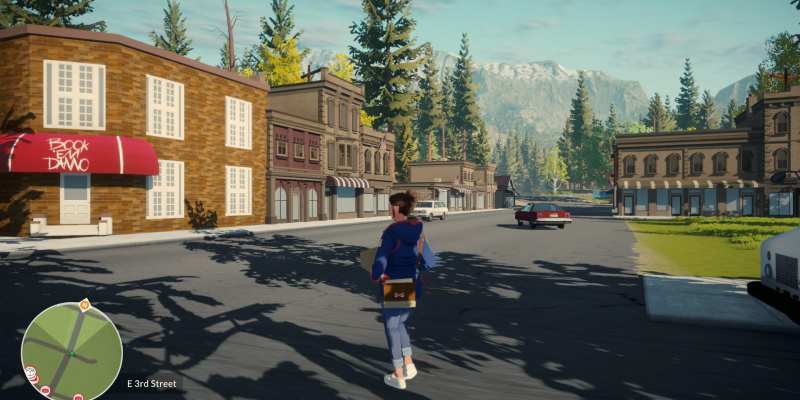“We just want to have a game that makes the experience sincere and mature. And we don’t want macho bullshit.”
That’s Jos Bouman from Gamious describing the team’s ambition for its headline project, Lake. It’s a cozy little narrative game that Bouman referred to as “some sort of anti-GTA.” As in that most notorious of video game franchises, you can free-roam either on foot or in a vehicle, but violence is firmly off the agenda.
Lake casts you as Meredith Weiss, a 40-something woman escaping the rat race of the city to deliver mail for two weeks in the hometown she left 20 years earlier. And while we should never judge a book by its cover, Meredith isn’t the sort to beat people up. Her role is “about creating a believable environment from all perspectives to enrich or make the gameplay and gameplay experience as logical as we want it to be,” said Bouman.
From a story perspective, she is there to help, and that justifies the game’s keen interest in humanity and the choices we make. There will be around 20 characters to interact with in Lake, ranging from a 15-year-old girl to an 80-year-old cat lady, “and all these people have made decisions or are about to make decisions in their life.”
The variety of life on display means the team has been able to make a game that Bouman claimed is true to life. You have grouches and weirdos mixed up with moments of pure joy, humor, and sincerity.
https://www.youtube.com/watch?v=ijd43kAL1Z4
“We hoped it might give some sort of catharsis,” said Bouman. The decisions that characters face are the kinds of everyday dilemmas that players are also likely to come across at some point in their lives, so Bouman wants the portrayals to feel authentic and relatable. “If (players) look at the Lake world and Meredith’s life and project it on their own life, we hope it might give them some sort of comfort.”
That desire to build a sense of connection or familiarity between game and player has filtered through the entirety of Lake. Perhaps the clearest example of that is the setting: Providence Oaks, 1986. This fictional village is born from an imagined nostalgia. It’s small-town America, so familiar even to non-Americans thanks to the likes of Gilmore Girls, Life is Strange, Veronica Mars, What’s Eating Gilbert Grape, and much besides. And it’s the ‘80s, remembered through rose-tinted glasses thanks to a plethora of film classics from the era and more recent reflections like Stranger Things, Firefly Lane, and Firewatch.
Lake began with the lake, and the absence of such environments in Gamious’ native Holland meant it had to look abroad for a physical setting. America was an easy pick. “We’re very familiar with American culture,” Bouman explained. “I think it’s just a common denominator thingy where most people know about small-town America also because of the movies. … We didn’t see a reason to make it more difficult than it needed to be.”
He talked, for example, about possibly setting the game in Scandinavia and how that would have brought with it additional baggage of “having to introduce life in such a different country.” That would have raised significant barriers to the team’s central goal to make the player “feel at home as soon as possible because they are in the game, their character – Meredith Weiss – they should feel like it’s a familiar environment and world.”

Meanwhile, the temporal setting was closer to home. Bouman, the game’s director Dylan Nagel, and several other team members all grew up in the ‘80s, so “it’s a period we look back to with fondness.” In addition to the nostalgia factor, it was a time before mobile phones and the preponderance of digital technology that is inseparable from modern existence. All of that plays into the desire to create an atmosphere that is at once relaxed and relaxing: “It’s also nice to be in a world where you are not controlled by mobile phones. … I think people would like to escape to a world where you’re not always online.”
At that point, thinking about the setting and Meredith’s age, I couldn’t help but ask if there was any intention to rehabilitate the image of Baby Boomers through Lake. “It would be quite noble because Boomers have been thrown lots of shade … recently,” replied Bouman. “It hasn’t been a thought of ours, but … if I think about it on the spot, it does make you realize how easy life was in the ‘80s compared to right now.”
He talked at length about his childhood, growing up with only two television stations that only broadcast after 6 p.m. and the hours spent trying to pick movies in a rental store compared to how people now “are bored with Netflix because you’re overwhelmed by lots of content, but there’s not that much that really stands out or is really good.”
So, while it’s not foremost in the minds of the development team, Bouman seemed optimistic at the idea that Lake “might create some understanding of how simplistic Boomers might look at the world today.”

Ultimately, Lake isn’t about being high-minded or pretentious. It’s not about making sweeping claims about human nature or reflecting on the limitations of other narrative games. Instead, “it’s all about creating interesting dilemmas that are not totally black and white.” It’s about giving players control over the story they experience. A part of that comes from ensuring the individual character stories are mostly isolated, enabling players to choose whom they engage with. Another part of it comes from the branching possibilities, which Bouman described as “an absolute monster.” And a third part of it comes from the choices that arise from everyday situations.
It’s that sincerity and apparent simplicity – combined with the kind of slow pace and eye-catching aesthetic that has previously elevated the likes of Spiritfarer, Journey, and Life is Strange – that has Lake turning heads. The most significant of those is undoubtedly Microsoft, which has signed a timed exclusivity deal for the title.
And Bouman is hopeful that players who have found their attention caught by Lake will not be disappointed when they get their hands on it, which is currently expected to be in May or June: “I just hope that the way we’re portraying the game and the trailers and the screenshots and the descriptions, we hope it’s a seamless transition to the playing experience.”

Bouman is also hopeful that Lake will prove to be a communal experience, inspiring players, YouTubers, and Twitchers to talk about, argue, and defend their choices because that’s what really matters.
“In Lake,” said Bouman, “one of the most important decisions you have to make in the end is – are you going to stay in the village and say goodbye to your career in the big city? Or are you going to decide that you want more out of life? You make decisions that feel best for you. … There is no right or wrong ending.”
“There’s nothing wrong with making life choices that are not overly ambitious,” he added. “If you look around on social media and you see all the careers that people have and their cosmopolitan lifestyle and all the things they do. I mean, does that really make you happy?”
